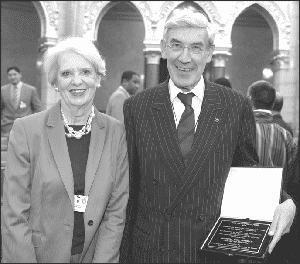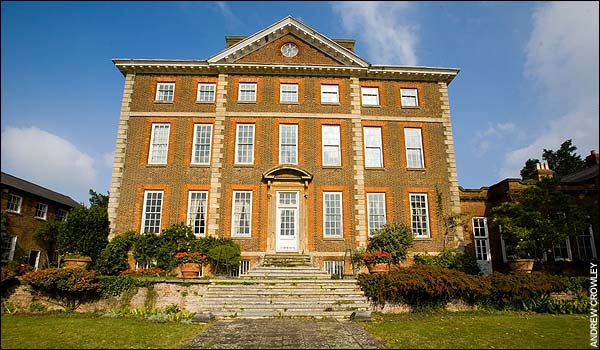
Times and others:
‘Suicide’ casts shadow over USAF links to defence contractor
Charles Riechers, deputy head of the Air Force’s multibillion-dollar procurement budget, is believed to have committed suicide amid controversy over his links to a defence contractor. Mr Riechers, who was found dead at his home in Virginia over the weekend, joined the USAF procurement team in January after his confirmation had been held up by the US Senate for two months.
During those two months Mr Riechers, who had served in the USAF for 20 years, worked for a defence advice company, Commonwealth Research Institute (CRI). According to reports, the $13,400-a-month (£6,600- a-month) job was arranged by the USAF as a favour while the Senate considered Mr Riechers’s confirmation. Quoted last month in The Washington Post, Mr Riechers said: “I really didn’t do anything for CRI. I got a pay cheque from them.”
A USAF spokesman said that it would co-operate with county officials who were investigating the death of Mr Riechers, but that the matter was “a civilian, not a military, one”. The arrangement has come under scrutiny from politicians concerned about this relationship. The case received additional attention last week when Pemco Aviation, another defence company, amended a legal challenge to a contract won by Boeing to mention CRI and its parent Concurrent Technologies.
Pemco is challenging a $1.2 billion contract awarded by the USAF to Boeing for the maintenance of air-refuelling tankers. Reuters said yesterday that Pemco was claiming that Boeing had close ties to Concurrent, so there might have been a conflict of interest in the hiring of Mr Riechers.
The USAF’s not having a lot of luck with their procurement officials, is it? Remember Reichers’ predecessor Darleen Druyun?
By George Cahlink
gcahlink@govexec.com
October 1, 2004Darleen Druyun, former No. 2 acquisition executive for the Air Force, was sentenced to nine months in prison on Friday for negotiating a job with Boeing at the same time she was involved in contracts with the company, the nation’s second-largest Defense contractor.
Druyun, 56, will serve nine months at a minimum security prison and another seven months at a halfway house or on home detention. She also was fined $5,000 and ordered to perform 150 hours of community service. Sentencing guidelines could have required Druyun to serve up to 16 months in prison.
Federal District Court Judge T.S. Ellis called the “stain of this offense very severe,” particularly while the nation was at war. Ellis agreed to allow Druyun to serve her sentence in South Carolina, where she plans to retire with her husband.
As part of the plea agreement, Druyun admitted that she did “favor the Boeing Company in certain negotiations as the result of her employment negotiations and other favors provided by Boeing to the defendant.” Previously, Druyun had admitted to negotiating a post-government job with Boeing, but steadfastly maintained that she had never favored them at the negotiating table.
Prosecutors said Druyun admitted to favoring the defense contractor after failing a lie detector test this summer. She also confessed to altering a personal journal to make it appear that there were no conflicts with Boeing.
Druyun’s plea agreement outlined four specific contract negotiations where she favored Boeing:
Druyun agreed to a higher price than appropriate for a proposed deal to lease 100 tanker planes from Boeing, which she called “a parting gift” to her future employer. She also shared a competitor’s proprietary data with Boeing.
- In 2002, Druyun awarded $100 million to Boeing as part of a restructuring of the NATO Airborne Warning and Control System contract. She said the payment could have been lower, but she favored Boeing because her daughter and son-in-law worked there and she was considering work there as well.
- In 2001, Druyun oversaw a $4 billion award to Boeing to modernize the avionics on C-130 J aircraft. She admitted she favored Boeing over four competitors because the company had given her son-in-law a job.
- In 2000, Druyun agreed to pay $412 million to Boeing as a settlement over a clause in a C-17 aircraft contract. She admitted to favoring the payment because her son-in-law was seeking a job with Boeing.
Officials with the watchdog group Project for Government Oversight lauded the conviction.“The Druyun case is offering an unusual view of just how cozy the Pentagon and defense contractors have become,” said POGO Senior Defense Investigator Eric Miller. “Her supplemental plea filed with the federal court on Friday details an even sleazier story than we could have imagined.”
“The Pentagon has been saying Ms. Druyun was a tough negotiator,” Miller continued. “Ironically, while she was working for the Air Force, as we initially suspected, she was actually negotiating on behalf of Boeing.”
The tanker purchase is now up for discussion in Congress again and there are fears that the USAF is trying to slant the process unfairly in favour of Boeing, again. Boeing is the red thread here, that and its relationship with the Bush administration and the Pentagon, which has been very cosy, particularly so during the 2004 election campaign:
Bush visit raises $2.4 million for Republican Party
After landing Friday afternoon at Boeing Field in Seattle, Bush said European nations should end their subsidies of Boeing rival Airbus. He declared the United States is prepared to take action before the World Trade Organization to stop them.
Bush made the comments after meeting with Boeing executives and employees in a company hangar.
The relationship is cosy enough even for a little espionage not to disrupt it. For instance, whatever happened to this Boeing radar scientist suspected of spying for Israel?? I don’t ever recall hearing of a charge or trial:
FBI Investigating Boeing Scientist
October 19, 2006 9:00 AMVic Walter and Eric Longabardi Report:
Agents in the FBI’s foreign counterintelligence unit have opened a criminal investigation into the handling of classified material by a senior scientist at Boeing.
The scientist, Abraham Lesnik, of suburban Los Angeles, works in the development of anti-missile systems for aircraft and holds a Department of Defense security clearance of Secret, Special Access, according to his resume filed in court papers.
The FBI has conducted three separate searches of Lesnik’s home in Valley Village, Calif., according to Lesnik’s lawyer, Marc Harris.
Investigators in the case say Lesnik’s Boeing laptop computer has been turned over to the FBI after questions were raised as to whether classified data ended up in the hands of unauthorized individuals including foreigners.Lesnik’s lawyer says his client “has never improperly transmitted any classified information to anyone.”
Lesnik’s neighbors say FBI agents have been conducting a 24-hour surveillance of his home for the past few weeks.
An FBI spokesperson confirmed search warrants had been served but said the affidavits filed with the court were sealed, and no other information on the case could be made public.
Boeing spokesperson Walt Rice tells ABC News, “Boeing is cooperating with U.S. Government investigators in this case, and as such, we cannot comment further.”
Odd.
While we’re on the subject of dirty tricks, at least $1500 of the money Bush raised at that Boeing visit went to fund skullduggery like the GOP’s fake ‘sex offender in your neighborhood’ cards in Washington State.
But back to those tankers and Reicher’s death.
If the Northrop Grumman team wins, most of the work would be done in Mobile, Ala. But engineering, management and some support services would be based in Melbourne.
If the Boeing team wins, most of the work would be done in Everett, Wash., and Wichita, Kan. Some of the work by Boeing and its suppliers would be in Florida, focused in cities such as Clearwater and Stuart.
There’s a lot resting on this tanker deal.
Why did Reichers kill himself, if indeed he did die by his own hand? That has yet to be proven, even though the wire services confidently asserted it was suicide within hours of the event’s announcement. If he did kill himself, was it from fear of prosecution or exposure or jail? If he didn’t, I ask again – who benefits?
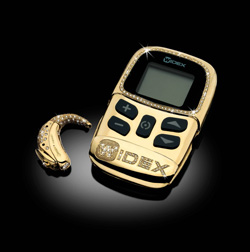
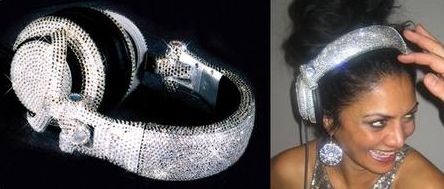



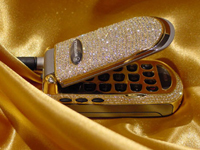 mine) to pop out every time the damned thing rang.
mine) to pop out every time the damned thing rang. 